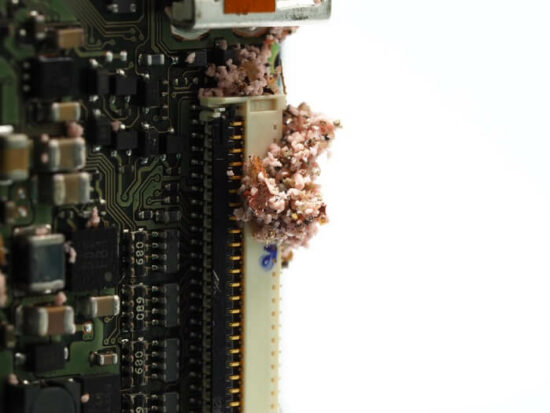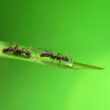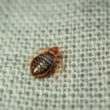Figuring out how to get ants out of electronics is trickier than it seems. These tiny little critters can fit into impossibly small nooks and crannies, which many electronic appliances are full of.
This guide will teach you how to get rid of ants that are hiding out in your electronics, what attracted them in the first place, and how to stop these pests from coming back.
Table of contents
Why Are Some Ants Attracted To Electronics?
Finding ants in electronics is not something that you would normally consider, but these insects are strangely attracted to everything electrical!
Quick Tip: When we refer to electronics, we are including things such as air conditioning units, circuit breakers, electrical outlets, hot water heaters and even your computer. This is by no means an all-inclusive list, since most electronic appliances are fair game.
So why are certain kinds of ants attracted to electronic devices? Actually, there are several reasons. The first theory is that ants are thought to be attracted to the electromagnetic waves given off by these devices. It’s not well understood why this takes place, but there is something about electrical fields that seems to attract foraging scout ants.
- Kills common household ants including acrobat, crazy, ghost, little black, odorous house, pavement, and other sweet-eating ants
- As worker ants discover the bait, they share it with the rest of the colony to eliminate them all
- You should see a significant decrease in the number of ants visiting the bait stations within just a few days
- Place stations near areas where you’ve seen ant activity
More often than not, these early scouts are electrocuted as soon as they get too close to the electrical current. When this happens they release a pheromone that actually attracts more ants to the area. Then the next group of ants die and release pheromones. This cycle can continue for quite a while until there is an infestation.
As mentioned above, electrical devices like computers and laptops can become infested by ants as well. In this case, it is usually more of a cleanliness issue than an electromagnetic attraction.
Do you snack while you’re on your laptop? Eat lunch while you’re working on your computer? All those crumbs that you inadvertently drop into your keyboard, or the greasy fingers that you place on your keyboard could potentially attract ants looking for a snack.
Type Of Ants That Get Into Electronics
Even though ants might basically look the same, different types of ants have very different habits and preferences.
For example, ants such as pharaoh ants, acrobat ants and white footed ants are attracted to the areas of your home where they are most likely to find food crumbs or sugary items.
Then there are all the varieties of ants that are often found in electronics. If you have an infestation in or near electrical items around your home, then there’s a good chance you’re dealing with fire ants, crazy ants, carpenter ants, acrobat ants, or super Asian ants. There are several other kinds of ants that can be found near electrical devices as well, but these are the usual culprits.
If you’re having trouble telling the difference yourself, an experienced and certified pest control specialist is a great resource to help you correctly identify the ants in your electronics. Knowing which ants you’re dealing with is an important step towards solving the infestation problem.
How To Get Ants Out Of Electronics
Having ants in your electronics is not only annoying, but it can become dangerous as well. If you find yourself in this situation, it is very important that you take care of the issue and do what you can to get them out.
If you’re the do-it-yourself type, then there are plenty of remedies (both chemical and all-natural) that you can try. As is with most anything, some of these methods will be more effective for you than others. Don’t be afraid to experiment with them and see which one works best in your situation.
Make sure you read the following instructions carefully to make sure that you’re doing things the right way. If you don’t get rid of the ants in your electronics properly, you may not be getting to the real source of the problem. Just killing the ants you see without destroying the nest is not going to get rid of the ants on a long term basis.
1. Set Up Ant Bait
The same way you might decide to set out ant baits in a kitchen to get rid of sugar ants, you can put out ant baits to clear an infestation in your electronics.
- Kills common household ants including acrobat, crazy, ghost, little black, odorous house, pavement, and other sweet-eating ants
- As worker ants discover the bait, they share it with the rest of the colony to eliminate them all
- You should see a significant decrease in the number of ants visiting the bait stations within just a few days
- Place stations near areas where you’ve seen ant activity
There are different kinds of ant baits such as sugary baits, greasy baits, protein-based and fat-based baits. However, they all work just about the same way. The bait entices the ants to eat the bait and bring it back to the colony. Once the queen eats the poisonous bait and dies, the whole colony will die.
To use this method you just need to place the bait near the infested area or areas. If you are able to locate where the ants are getting in, then you can place some of the bait near that area as well. Then all you have to do is wait. It’s not going to happen overnight, so patience is going to be important.
If for some reason the type of bait you used doesn’t work, then it’s totally fine to try a different kind. You may even discover that a combination of different baits works best. Borax is commonly used to kill ants, so we highly recommend giving that a shot.
Quick Tip: This is a pretty good method for getting ants out of electronics like circuit boxes, water heaters, air conditioners and other related appliances. However, this may not be a practical method for computers or laptops unless you are able to leave your device alone until the infestation is gone.
2. Use Ant Spray
Trying a spray may be your natural instinct to get rid of ants in electronic appliances, but you need to know when it’s the right time to use it. The success of using an ant spray depends heavily on the kind of infestation you’re dealing with.
There is no lack of good ant sprays on the market, but using a spray is not a good idea for an electrical appliance like a computer or laptop. In general, sprays should also not be used if the spray is going to get anywhere near an electrical socket or wiring. This can cause a short circuit or even a fire.
So how are you supposed to use an ant spray in this situation? We recommend spraying the insecticide around or as near as possible to the device or appliance with the problem. This will at least kill the ants that are going to and from the infested area near your electronics.
Quick Tip: Please note that ant sprays are only a band-aid when it comes to getting ants out of electronics. They shouldn’t be considered a long term solution, because they don’t kill the whole colony.
3. Try An Air Duster
If you have a laptop or computer, going with the methods we listed above might not be the most practical or effective course of action. Instead, one of the best things to use in this kind of a situation is an air duster.
An air duster is basically a tiny air compressor that’s designed to clean dirt, dust, and food crumbs from inside your keyboard and other electronics. You may know it as canned air, dusting gas, or compressed air, but all of these names really mean the same thing.
When using an air duster to get ants out of electronics, you just have to spray it the same way you would if you wanted to get rid of other debris. The hard blast of air that is released will knock ants out of the area (it will probably kill many of them as well).
Quick Tip: It’s important to remember that an air duster does not actually contain air. What comes out of the air duster is a compressed propellant that is not safe to breathe. Use precautions such as gloves and a mask while using an air duster to be safe.
4. Sprinkle Diatomaceous Earth
Diatomaceous earth is a popular way to control and get rid of ants in electronics (and in general). That’s because it’s an all-natural alternative that is inexpensive and safe to use around people and pets.
At first glance, diatomaceous earth may look like a chemical powder, but it’s actually crushed fossilized algae and diatoms. When the sharp, tiny particles of these fossilized creatures come in contact with the ants, the ants get scratched. This results in them dehydrating and eventually dying.
The neat thing about diatomaceous earth is that it’s not a pesticide, making it a very eco-friendly form of pest control. It should be used as a kind of barrier around the electronic appliances that seem to be attracting ants. It makes a great perimeter treatment, but it will not get rid of the whole colony. Sprinkle it around your outdoor electrical appliances, or you can even place it in the corners of your house where you may see ants congregating.
How To Keep Them Out Of Your Electronics In The Future
Now that you’ve taken the time and effort to get ants out of your electronics, you’ll need to take the proper steps to ensure that there is not a repeat performance. Unless you’re vigilant, the chance that ants will come back will always be there.
There are some simple, common sense things that you can do to greatly reduce the odds of finding ants in your electronics. Let’s take a look at a few of the most common methods of infestation prevention. If you have questions, you can always ask us for advice!
The first step you should take is to practice good hygiene and vigilant housekeeping. By this we mean that all crumbs and food particles should be vacuumed up every day, floors and countertops should be cleaned and garbage should be taken out at least once a day.
If you’re on your computer or laptop during the day, wash your hands often to prevent a build-up of grease or the scent of food on the keyboard. Be careful not to drop crumbs or other food items on the keyboard. It’s also important to wipe down your electrical devices with a cleaner that’s safe for electronics (always remember to unplug your device before attempting any cleaning).
Secondly, you will need to take a careful look at all of your appliances to see if you find holes or entry points. Any entry points that you find need to be sealed up. Before you attempt to seal any holes, make sure that the product is safe to use around electrical appliances. Common sealants include electrical tape, rubber or Teflon. Also, be sure that you’re not covering up an opening that’s used for airflow for ventilation!
Quick Tip: Using foods such as garlic, cinnamon, lavender, cucumber peels, or baby powder can sometimes keep ants out of your electronics. However, this method is not always the most practical and won’t work in every situation.
Lastly, you can try mixing up your own concoction using ingredients you probably have around the house. Most of these home remedies contain boric acid, which will kill the ants when they’ve taken it back to their colony. Here are some options to try:
- Mix one tablespoon of boric acid with 1 1/4 cup of sugar. Sprinkle this mixture near the area of concern.
- The other method to try is to mix two tablespoons of peanut butter, two tablespoons of honey and half a teaspoon of borax. After the ingredients are thoroughly combined, spread the peanut butter mixture near the areas where you want to prevent and control ants.
- If you’re looking for a remedy in the form of a spray, then you can mix equal parts of vinegar and water in a spray bottle. Remember, this spray is for around the appliance only. Never spray this solution on wires, cables or electrical outlets. Always unplug everything before using this or any spray.
Can Ants Seriously Damage My Electrical Appliances?
An infestation of ants in your electrical appliances is no joke. Depending on where the infestation is and the size of the infestation, you may end up with considerable damage.
Infestations in electrical appliances such as circuit breakers, water heaters, air conditioners, telephone boxes, or other large electronics can cause serious damage to wiring and internal parts. A large enough infestation can create a short circuit or even a fire in extreme cases!
Conclusion
Now that you know how to get ants out of electronics, it’s just a matter of putting in the time to get rid of them! These critters are more persistent than they are clever, so all you need to do is stick to the recommendations above and you should be just fine.
Let us know if you have any questions about this guide or if you have an infestation that’s giving you more trouble than you expected. We’re always happy to help!



